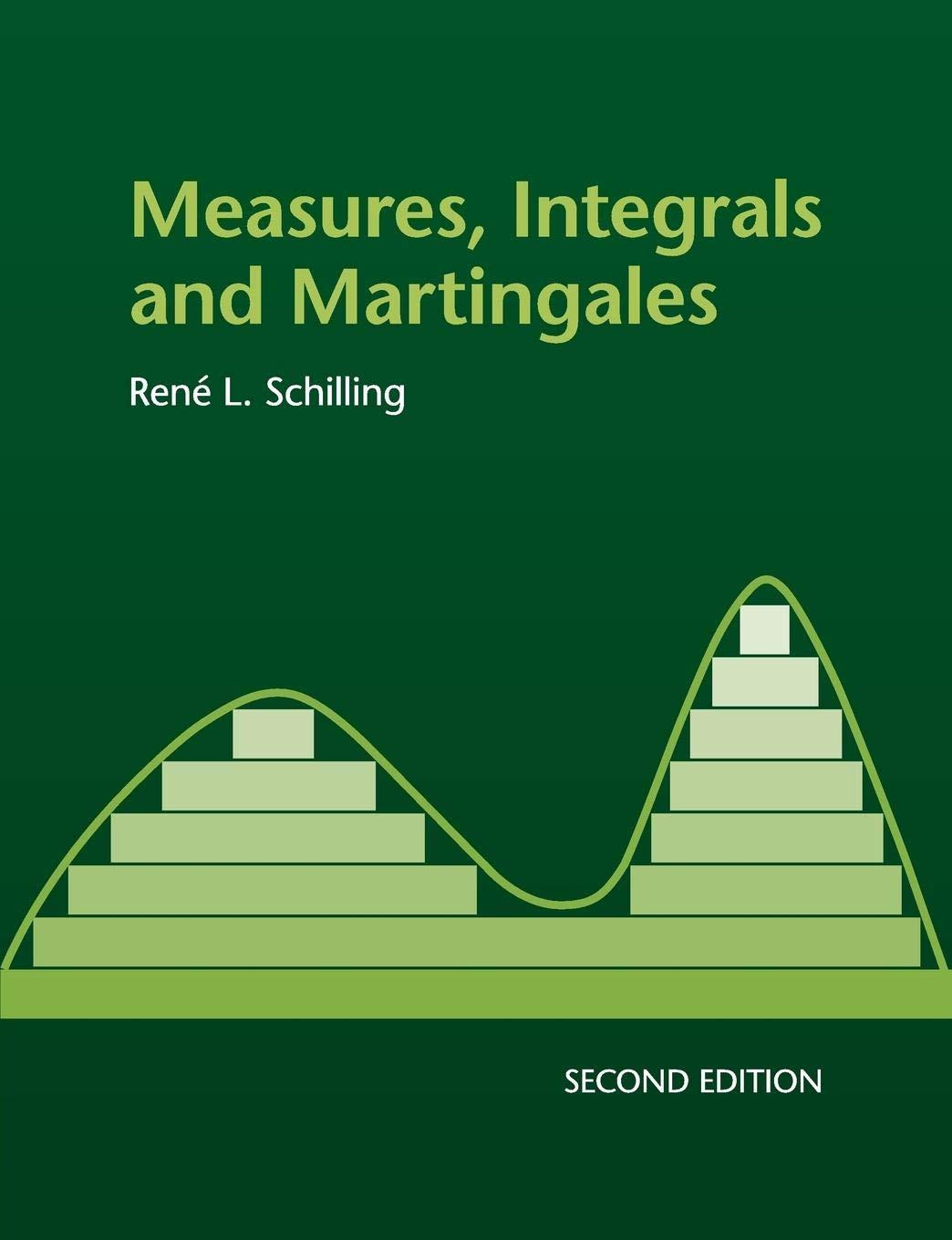Let (mu) be a finite measure on (left(mathbb{R}^{n}, mathscr{B}left(mathbb{R}^{n}ight)ight)) and denote by (phi(xi):=widehat{mu}(xi)) the Fourier transform (i)
Question:
Let \(\mu\) be a finite measure on \(\left(\mathbb{R}^{n}, \mathscr{B}\left(\mathbb{R}^{n}ight)ight)\) and denote by \(\phi(\xi):=\widehat{\mu}(\xi)\) the Fourier transform
(i) \(\phi\) is positive semidefinite, i.e. for all \(m \in \mathbb{N}, \xi_{1}, \ldots, \xi_{m} \in \mathbb{R}^{n}, \lambda_{1}, \ldots, \lambda_{m} \in \mathbb{C}\) we have \(\sum_{k, l=1}^{m} \phi\left(\xi_{k}-\xi_{l}ight) \lambda_{k} \bar{\lambda}_{l} \geqslant 0\). (This means that the \(m \times m\) matrices \(\left(\phi\left(\xi_{k}-\xi_{l}ight)ight)_{k l}\) are positive hermitian.)
Remark. The converse assertion also holds, see Problem 21.4 .
(ii) Let \(m \in \mathbb{N}\). Show that \(\int|x|^{m} \mu(d x)<\infty \Longrightarrow \phi \in C^{n}\left(\mathbb{R}^{n}ight)\).
(iii) Let \(N \in \mathbb{N}\). Show that \(\phi \in C^{2 N}\left(\mathbb{R}^{n}ight) \Longrightarrow \int|x|^{2 N} \mu(d x)<\infty\).
[ It suffices to consider \(n=1\) and \(N=1\). Observe that we have \(\phi^{\prime \prime}(0)=\) \(\lim _{h ightarrow 0}(\phi(2 h)-2 \phi(0)+\phi(-2 h)) /\left(4 h^{2}ight)\), express this identity using Fourier transforms and use Fatou's lemma.]
(iv) The support of a measure \(\mu\) is the smallest closed set \(K \subset \mathbb{R}^{n}\) such that we have \(\mu(U)=0\) for all open sets \(U \subset K^{c}\). If supp \(\mu\) is compact, then \(z \mapsto \phi(z)\) is well-defined for \(z \in \mathbb{C}^{n}\) and analytic.
Data from problem 21.4
Bochner's theorem. A function \(\phi: \mathbb{R}^{n} ightarrow \mathbb{C}\) is positive semidefinite, if the matrices \(\left(\phi\left(\xi_{i}-\xi_{k}ight)ight)_{i, k=1}^{m}\) are positive hermitian for all \(m \geqslant 1\) and \(\xi_{1}, \ldots, \xi_{m} \in \mathbb{R}^{n}\), i.e. \(\sum_{i, k=1}^{m} \phi\left(\xi_{i}-ight.\) \(\left.\xi_{k}ight) \lambda_{i} \bar{\lambda}_{k} \geqslant 0\) for all \(\lambda_{1}, \ldots, \lambda_{m} \in \mathbb{C}\). The steps below sketch the proof of the theorem.
Theorem (Bochner). A continuous function \(\phi: \mathbb{R}^{n} ightarrow \mathbb{C}\) is the Fourier transform of a finite measure \(\mu\) on \(\left(\mathbb{R}^{n}, \mathscr{B}\left(\mathbb{R}^{n}ight)ight)\) if, and only if, \(\phi\) is positive semidefinite.
(i) The Fourier transform \(\widehat{\mu}(\xi)\) of a finite measure \(\mu\) is continuous and positive semidefinite.
(ii) Assume that \(\phi\) is continuous and positive semidefinite. Then \(\phi(0) \geqslant 0, \phi(\xi)=\overline{\phi(-\xi)}\), and \(|\phi(\xi)| \leqslant \phi(0)\).
[ use that \((\phi(0))\) and
\[
\left(\begin{array}{cc}
\phi(0) & \phi(-\xi) \\
\phi(\xi) & \phi(0)
\end{array}ight)
\]
are positive semidefinite matrices.]
(iii) Prove that \(u_{\epsilon}(x):=\iint \phi(\xi-\eta)\left(e^{i x \cdot \xi} e^{-2 \epsilon|\xi|^{2}}ight) \overline{\left(e^{i x \cdot \eta} e^{-2 \epsilon|\eta|^{2}}ight)} d \xi d \eta\) is positive and that
\[
u_{\epsilon}(x)=\frac{1}{c} \int \phi_{\epsilon}(\eta) e^{i x \cdot \eta} d \eta \quad \text { with } \phi_{\epsilon}(\eta)=e^{-\epsilon|\eta|^{2}} \phi(\eta)
\]
(iv) Show that the function \(u_{\epsilon}\) is Lebesgue integrable.
(v) Conclude that \(\phi_{\epsilon}\) is the Fourier transform of \(c u_{\epsilon}\). Apply Lévy's continuity theorem (Problem 21.3) to \(\lim _{\epsilon ightarrow 0} \phi_{\epsilon}(\xi)=\phi(\xi)\).
Step by Step Answer:






